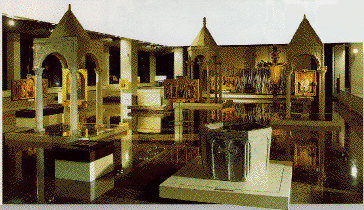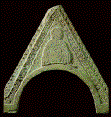

The Museum of Croatian Archaeological Monuments was founded in Knin in
1893. After WW II it was moved to Split and since 1976 it has been in the
present building. The Museum has a rich collection of Early Medieval
stone monuments and collections of weapons, tools, jewellery, coins and
objects of everyday usage. Of special importance are the epigraphic
monuments from the IXth to the XIIth century where we find engraved the
names of Croatian kings and other eminent dignitaries. These represent an
extraordinarily rich "archives in stone", rare in the Europe of the time.
The preserved stone monuments are in mostly segments of altar partitions
and of other furniture of the pre-Romanesque churches in Croatia.

Numerous findings from old Croatian graves offer abundant material for research of the economic, cultural and political life of the Croatian people during the Early Middle Ages. Swords, spears, knives, arrows, axes and spurs have been found in graves of warriors, all of which, according to their make, belong to the Carolingian cultural circle. The most numerous grave findings are different froms of jewellery: earings, rings, necklaces, diadems, buttons and such-like. These can be sorted into a number of types encompassing a long span of time from the VIIth to the XVth century and are, for the most part, products made in local workshops and by native masters. Findings of gold Byzantine and other Medieval coins are also valuable. In the area around the Museum foundations of three basic types of pre-Romanesque churches from old Croatian times and a number of standing tomb-stones from the XIVth and XVth centuries are displayed recalling the appearance of a necropolis of that time.
The Museum issues its own journal. There is a guide-book to the Museum in Croatian and English.